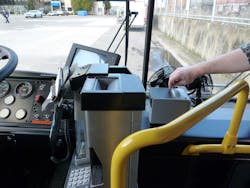There is a social worker air to developing tactics cited by transit agencies undertaking de-escalation programs, like operator roundtables, storytelling or verbal judo. Call them what you will: these and other tactics have found early success in avoiding the spasms of violence against operators seen at a swath of other North American agencies in the first quarter of 2017.
In January, there were arrests for two separate assaults on New Jersey Transit operators, a bus operator was spit on and punched in the Bronx, and another person was arrested for alleged sexual assault of a city bus operator in Vancouver. In late March, a “delusional” man was arrested after he boarded a Las Vegas bus and shot indiscriminately at strangers, killing one rider.
“It’s a national issue,” said Harry Saporta, executive director of safety and security for Portland’s TriMet system.
As public facing entities, transit agencies like TriMet and Metropolitan Transit Authority of Harris County (Metro) are molding and reshaping operator approaches to language, customer service and protocol in the hopes of curbing violence by passengers, the source of which can be complicated and somewhat unknowable.
Last summer, TriMet brought on “de-personalizing” fare collection techniques for use by drivers — “Our policy requires fare” as opposed to “You have to pay fare”, for instance — based on National Transit Institute (NTI) recommendations. Taken a step further, about half of TriMet’s 1,300 bus operators have been trained in “verbal judo,” where openness, persuasiveness and options are stressed.
Saporta, who also sits on the Federal Transit Administration's Transit Advisory Committee for Safety, has arranged at TriMet a transit safety committee comprised of operators, management, police and a district attorney. Recommendations from that committee and other transit paragons have lead to a modified standard operating procedure on fare collection and a general encouragement for operators to share successful scenarios. The comprehensive communications approach to de-escalation is, in Saporta’s words, “making this thing much more powerful.”
TriMet has tallied three physical or verbal assaults against operators so far this year, a far lower per-month “downward trend” than last year, when there were 31 total. Saporta said it was “premature” to know the larger impact quite yet. In the meantime, TriMet is on a trial run with three partial barricades for operators, with three more to be deployed on the fleet this year.
Capt. Carl Clark is a leader of transit police officers and patrols Metro, surrounding Houston, Texas. A 28-year veteran of a transit force that covers 1,300-square-miles, Clark said he’s seen a trend recently in drivers who can avoid “heated” conversations with riders by sidestepping debates on money and calling in officers to handle conflict.
“You don’t know what that individual is dealing with when they’re boarding a bus. Any negativity could be their tipping point,” Clark said.
Houston Metro provides customer service training with components on safety to all new and re-certified operators. Additionally, operators and ranking transit police have started monthly roundtable discussions on security best practices and trouble spots or riders along routes. Since late 2015, the transit agency adopted a suspension program for problematic passengers who may not have had “outright criminal” restrictions from riding buses.
Clark has also seen a dip in physical and verbal assaults against his agency’s operators, down to eight for the first four months of the year. However, he was quick to warn that in his experience, unruly activity spikes during the summer months.
Attention-grabbing assaults and the new tactics to avoid them remain a rarity with a few smaller agencies. In “Happy Valley,” the Centre Area Transportation Authority (CATA) can count no physical incidents with operators of its bus or paratransit routes in the past 16 years, according to Jackie Sheader, public relations officer, and Ken Morder, safety and training manager. The central Pennsylvania system has about 120 operators — and no transit police — for its 7 million passengers per year, the vast majority of which are students at Penn State. New CATA drivers take a customer service and de-escalation training, the latter led by a former Dayton, Ohio, police officer, and Morder said they have identified two routes where sometimes rowdy college students are met on board by an additional transit supervisor.
But nothing really exceeds “yelling,” Sheader said, which she attributed to the less urban environment.
“We hire based on customer service, so we wouldn’t bring on a person who we felt could handle a situation,” she said.
“Five Universal Truths of Verbal Judo”
- All cultures want to be treated with dignity and respect.
- All people would rather be asked than told what to do.
- All people want to know why they are asked or told to do something.
- All people would rather have options than threats.
- All people want a second chance to make matters right.
(Courtesy: TriMet PIO office)
About the Author

Justin Kern
Justin Kern is a writer and nonprofit marketing manager who lives in Milwaukee with his wife and cats.
